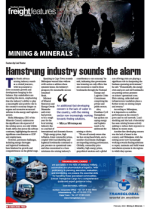As global challenges continue to ripple through the logistics sector, the mining industry is experiencing a heightened awareness of the critical importance of timely deliveries, cost-effectiveness, urgency, and overall logistics requirements. Companies in the sector are waking up to the significance of efficient project management in mitigating delays and enhancing productivity.According to Tiago Pocinho, country manager of Rangel South Africa and Zambia, with the mining industry increasingly realising the importance of streamlined logistics and considering the sector's role as a cornerstone in the global economy, the company is continuing to grow its mining footprint. “Through implementing a comprehensive strategy, we plan to double our turnover in the mining unit by 2024,” he told Freight News. “Anticipating future demand, we are directing greater investments towards expanding our f leet and venturing into new SADC countries, positioning ourselves for success in emerging markets and ensuring a robust g row th trajec tor y.”He said this followed extensive investments into Rangel’s mining sector services throughout 2023, including f leet and specialised equipment acquisitions.“In parallel, we launched our abnormal and heavy haul solutions unit in 2023 to support the project cargo services to the mining industry and more recently, due to our experience in air, sea and road transportation and in response to market demand, we launched the hazardous, explosives, chemicals and petrochemical unit dedicated to cross-border transportation.”He said through its systematic growth strategy, Rangel had grown its presence in Africa, particularly in Angola, Mozambique, Zambia, Tanzania, and South Africa. “We have also invested in local teams in countries such as the Democratic Republic of the Congo (DRC), Namibia, and Botswana to cover all the mining main seaport gateways and corridors.Pocinho said interest in the continent’s critical mineral reserves was soaring. “Lithium, copper, cobalt and nickel are vital to the energy transition and are opening up new mining opportunities across Africa. We have seen growing investment in the mining sector on the African continent in recent years, largely due to the strong pressure that the energy transition is exerting on the sector. There are clear opportunities for mineral extraction in terms of raw materials on the African continent. Still, these countries must have the necessary logistical conditions for a smooth supply chain.”He said while mining houses were increasingly focused on efficiency, there was no denying the inherently complex and hazardous nature of ore extraction and transportation that presented numerous operational and logistical challenges. “The infrastructure deficit continues to hamper the extraction of critical minerals such as lithium, copper, cobalt, and nickel. To enhance competitiveness, productivity and sustainability, companies in this sector are seeking innovative approaches and specialised exper tise.”According to Pocinho, while investment in infrastructure has been increasing, it needs to remain at the top of the continent's agenda. Welcoming investments into the expansion of the railway links between the Port of Lobito in Angola and the mines in northern Zambia and the south of the DRC, he said by connecting these three countries, it would now be possible to increase exports from Zambia, Angola and the DRC, boosting the regional circulation of goods. Ongoing investment in the Port of Maputo, where a 25-year extension on the port’s lease was recently granted, was just as important.“Optimising transportation is crucial in managing logistics,” said Pocinho, particularly in the remote and challenging African landscapes where there is increased demand from key sites like Manono Projects, a major lithium producer in the DRC that covers 188 square kilometres.“In various parts of Africa, there are opportunities for mineral wealth. South Africa excels in platinum and holds vast gold reserves, but it faces challenges transitioning from coal to cleaner energy. Ghana focuses on gold, emerging as a lithium powerhouse, while manganese supports the steel industry. Tanzania stands out for its gold production, diamonds, and nickel for stainless steel.Pocinho said that given the increase in the production capacity and product reserves of mining companies in Africa, exports would undoubtedly increase over the next few years, particularly as demand from markets such as the USA, the EU, and the Middle East rose. This, in turn, would drive demand for efficient logistics.

